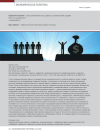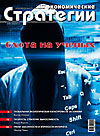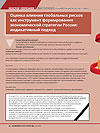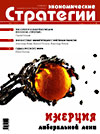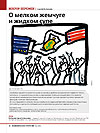Poverty, Inequality, National Wealth: Empirical Analysis and Policy Implications
DOI: https://doi.org/10.33917/es-4.184.2022.70-81
The article is devoted to the study of poverty and inequality in the economic growth of the most developed countries, with a general focus on the formation of social policy consistent with the growth policy. The purpose of the study is to conduct a macroeconomic analysis of poverty, inequality and wealth in the G7 countries, China and Russia, with the ensuing substantiation of a social development strategy for the Russian economy. The methodology is made up of empirical analysis, as well as regression modeling, which make it possible to identify in a comparative way the connectivity of the dynamics of relevant indicators of social development — the level of national poverty and wealth, the Gini coefficient and general inequality, growth rate, human development index. The result of the study is a precisely confirmed empirical relationship between the level of poverty and inequality for the countries considered, that is, a high value of one parameter corresponds to a high value of another. Consequently, poverty reduction may imply a reduction in inequality, and not only relative, but also absolute. In addition, it was found that for developed countries, high levels of poverty and inequality mean low values of the human development index. Social policy aimed at human development requires that its instruments be harmonized, including the necessary alignment with the current macroeconomic policies to stimulate growth. The magnitude of national wealth does not guarantee high growth rates, as well as low levels of inequality and poverty. A high level of inequality can accompany economic growth, having a positive effect on the growth rate, as for the Russian economy. In this regard, the current policy needs a reasonable selection of measures to stimulate growth and, at the same time, measures to reduce inequality, which can and should not be limited only to tax changes that require special confirmation of influence, but to institutional changes that regulate the creation and appropriation of income.
Источники:
1. Aganbegyan A.G. Kak preodolet’ stagnatsiyu i novyi krizis, obespechiv sotsial’no-ekonomicheskii rost [How to Overcome Stagnation and New Crisis, Providing Socio-Economic Growth]. Ekonomicheskie strategii, 2020, vol. 22, no 5, pp. 34–45, DOI: 10.33917/es-5.171.2020.34-45; no 6, pp. 6–19, DOI: 10.33917/es-6.172.2020.6-19.
2. Adzhimoglu D., Robinson Dzh.A. Pochemu odni strany bogatye, a drugie bednye. Proiskhozhdenie vlasti, protsvetaniya i nishchety [Why Some Countries are Rich and Others are Poor. The Origin of Power, Prosperity and Poverty]. Moscow, AST, 2016, 693 p.
3. Livshits V.N. Bednost’ i neravenstvo dokhodov naseleniya v Rossii i za rubezhom [Poverty and Inequality of the Population Incomes in Russia and Abroad]. Moscow, IE RAN, 2017, 52 p.
4. Stiglits Dzh. Tsena neravenstva. Chem rassloenie obshchestva grozit nashemu budushchemu? [The Cost of Inequality. How does Social Stratification Threaten Our Future?]. Moscow, Eksmo, 2015, 512 p.



